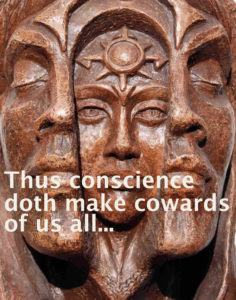 “Thus conscience doth make cowards of us all;
“Thus conscience doth make cowards of us all;
And thus the native hue of resolution
Is sicklied o’er with the pale cast of thought.
And enterprises of great pith and moment
With this regard their currents turn awry,
And lose the name of action” (Hamlet act 3, sc. 1)
Tips for Use. This is the end of Hamlet’s famous monolog and the lines, both in their entirety or parsed out, lend themselves to a number of applications – as well as to more general considerations. Let’s keep in mind that here “conscience” can both be interpreted as the ‘conscience’ (what prevents some from doing evil), and ‘consciousness’ as awareness of our limitations.
In a corporate setting use the first three lines when someone opposes your plan of action with flimsy arguments, based on fear, that do not hold water.
If ‘conscience’ is called into question you can still apply the lines if it is uncertain whether the objections are a cover and have nothing to do with conscience.
The theme of this most famous monolog of all… (“To be or not to be”). Hamlets wonders what holds people from taking their own lives, given the misery they encounter. These lines are very applicable today, notably in Europe where more and more people, in particular pensioners and small commercial operators and artisans are taking their own lives for not being able to economically survive.
This blog cannot do justice at the complexity of the issue but it is abundantly clear that in this new world or “new American century” the law of the market has replaced the 10 commandments, of which the first is “Thou shall have no other god but greed”. Or, if you like, capitalism for the poor and socialism for the rich. Or yet, privatization of profits and socialization of losses.
Let’s watch the image of the Greek old age pensioner who lit himself on fire and died to protest the shameless impositions of the IMF and associates. On the one hand a thief and a rapist (Dominique Strauss-Kahn) walking free in unspeakable luxury – on the other a pensioner who made poor by the new religion of greed sacrifices his life in protest and as an example. What holds from rebellion against the 1%, how many people must kill themselves to prompt the others into action. Is it really conscience that makes cowards of us all?
To receive an (almost) daily copy of the latest blog and Shakespearean verbal ‘weapon’ subscribe for free to this site (click on the top-right link on the menu) top the contact form.
And I promise, no sales calls, trade leads, venomous schemes, hidden plots, Machiavellian conspiracies, commercial ploys, psychological tricks, leads exchanges, barter proposals, suggestions or offers of any kind imaginable (and unimaginable).
Of course, if you acquire the book “Your Daily Shakespeare” you will not only enjoy it but you will find it very useful. The quote in this post and more than ten thousand others will lead you to find the words that perfectly strengthen your argument(s). After all Shakespeare wrote them, I simply extracted, structured and compiled them so as to make Shakespeare both useful in your life endeavors and very “user friendly” as they say. And if you wish I will even sign the book. But this is the extreme extent of any “sales” effort, call or solicitation.
In the play. Life is so inherently laden with problems and pain that suicide may appear the most logical solution. But men are afraid of what they will find in their afterlife – “the undiscovered country, from whose bourne no traveller returns.
Original Image: http://thegodguy.wordpress.com/2010/11/16/there-are-two-kinds-of-truth/
